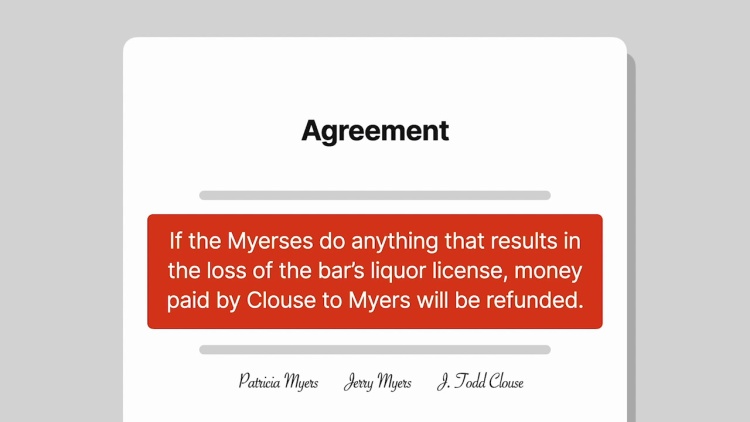Clouse v. Myers
Missouri Court of Appeals
753 S.W.2d 316 (1988)
- Written by Mary Pfotenhauer, JD
Facts
Patricia Myers (defendant) operated the Green Door tavern. J. Todd Clouse (plaintiff) entered into an agreement with Patricia and her husband, Jerry Myers, titled “Employment/Management Contract.” Under the agreement, the Myerses agreed to hire Clouse to manage the business in exchange for a percentage of the net profits, and Clouse agreed to pay the Myerses $7,500 at the time of signing and an additional $7,500 at a later date. The agreement also provided that if the Myerses caused the loss of the tavern’s liquor license, they would refund any money paid by Clouse. The liquor license for the Green Door was in Patricia’s sole name. When the Missouri Division of Liquor Control learned that Clouse was operating the Green Door without a liquor license, contrary to Missouri law, it notified Patricia that she would need to apply for a license in the names of all of the business’s partners. Patricia instead chose to relinquish the liquor license. Clouse sued the Myerses for misrepresentation and for a refund of the $7,500 he had paid them. The Myerses counterclaimed for the $7,500 still owed to them under the contract. At trial, Clouse testified that he knew the Green Door’s license was in Patricia’s sole name and that the contract was, in fact, a partnership agreement, not an employment contract. Clouse also testified that the reason for labeling the contract an “Employment/Management Contract” was to allow him to operate the tavern under Patricia’s license. The trial court entered a judgment for Clouse on his claims for $7,500 and a judgment against the Myerses on their counterclaim. The Myerses appealed.
Rule of Law
Issue
Holding and Reasoning (Greene, J.)
What to do next…
Here's why 911,000 law students have relied on our case briefs:
- Written by law professors and practitioners, not other law students. 47,100 briefs, keyed to 997 casebooks. Top-notch customer support.
- The right amount of information, includes the facts, issues, rule of law, holding and reasoning, and any concurrences and dissents.
- Access in your classes, works on your mobile and tablet. Massive library of related video lessons and high quality multiple-choice questions.
- Easy to use, uniform format for every case brief. Written in plain English, not in legalese. Our briefs summarize and simplify; they don’t just repeat the court’s language.





